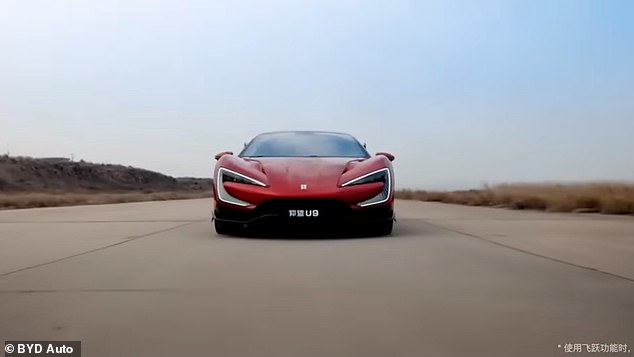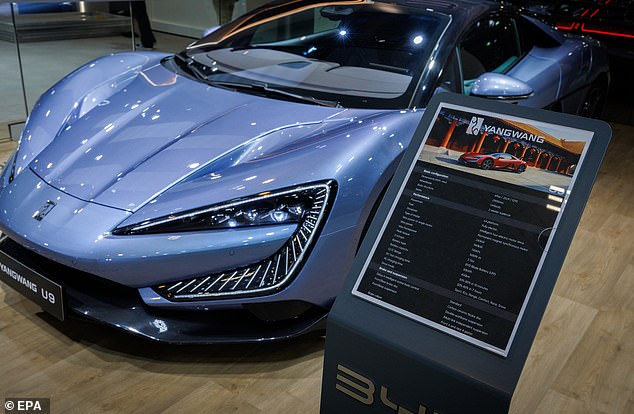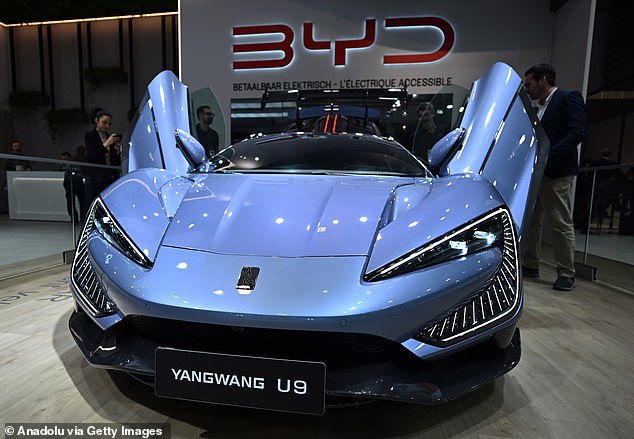The answer to Britain’s pothole crisis? Futuristic supercar can jump over six meters over holes in the road, but has an eye-watering price tag
If you’re tired of carefully driving around Britain’s potholed roads, there’s good news: a futuristic car could make navigating these chasms much easier.
An impressive featurette from BYD shows the Yangwang U9 sports supercar jumping over obstacles, including a 6-meter pit.
The autonomous vehicle speeds at nearly 75 miles per hour while making little bunny hops in the air, without anyone in the driver’s seat.
Like an agile land mammal, the U9 first shrinks, then bounces up and shoots all four wheels off the ground at the same time.
The vehicle boasts some impressive specs: it can go from 0 to 60 mph in just 2.36 seconds, with a top straight-line speed of 241.94 mph.
The Yangwang U9 doesn’t come cheap, though – prices start at an eye-watering 1.68 million yuan ($230,000/£186,000).
BYD – which stands for Build Your Dreams – sells cars equipped with the latest high-tech features such as 360-degree cameras, sensors, radar and internet connectivity.
Some experts fear they could be used for remote surveillance on behalf of the Chinese government, although BYD denies this.
As it approaches the water-filled pit, which is six meters long, the U9 recognizes the danger and performs a small bunny jump

A BYD Yangwang U9 electric vehicle (EV) from Chinese automaker BYD is on display at the Singapore Motor Show in Singapore on January 9, 2025

If you’re tired of carefully driving around Britain’s potholed roads, there’s good news: a futuristic car could make navigating these chasms much easier
The 100 second clip, posted on BYD’s Weibo accountshows the Yangwang U9 racing through an obstacle course at a speed of 120 km/h.
As he approaches the water-filled pit, he recognizes the danger and performs the little bunny jump.
It then clears a series of one-centimetre road spikes – the sharp little devices used to stop or slow vehicles by puncturing their tires.
Finally, he jumps over colored chalk lines on the ground, although his back wheels hit the chalk, causing a cloud to fly in his wake.
BYD hasn’t revealed the reason for the jump feature, but the neat trick is thanks to the company’s intelligent ‘DiSus’ suspension system.
The system can raise and lower the car quickly, causing it to bounce up and down both in motion and when stationary, known as a ‘dance’.
“The BYD DiSus system will further secure BYD’s global pioneering position in the industry,” said Wang Chuanfu, chairman and president of BYD.
“It is the first self-developed intelligent body control system launched by a Chinese car company and marks the breakthrough from zero to one.”

The vehicle boasts some impressive specifications as it can go from 0 to 100 km/h in just 2.36 seconds, with a top straight-line speed of 391.94 km/h (243.54 mph).

Mass production of the U9 began in August last year, although BYD’s Yangwang luxury brand is currently only available in China
Photos from the recent Brussels Motor Show also show that the Yangwang U9 has a series of ‘butterfly doors’, which move upwards rather than outwards to open.
Yangwang U9 – which can drive 450 kilometers on a single charge and can connect two chargers simultaneously – was unveiled last year.
It follows the U8, a monster of an off-road SUV launched in September 2023 and designed to survive in rough conditions.
The $150,000 U8 comes with a satellite phone in case a driver gets stuck out of cell phone range, and is built on a platform that allows it to run on the spot, like a tank.
Mass production of the U9 began in August last year, although BYD’s Yangwang luxury brand is currently only available in China.
Yangwang’s European launch date is planned ‘by 2026’, Car dealer reports, but some BYD vehicles are now available in the UK.
Currently, the vast majority of BYD’s passenger cars are sold in China, although the country is driving rapid expansion across Europe.
BYD is one of the largest electric bus manufacturers in North America, but has no plans to sell electric passenger cars in the United States.

BYD is reportedly planning to bring its Yangwang luxury brand to Europe. Pictured: The U9 during the 101st Brussels Motor Show at Brussels Expo in Brussels, Belgium on January 10, 2025
BYD’s first electric car to hit the UK market – the £36,000 Atto 3 – was released in Britain in spring 2023, followed by the Dolphin and Seal.
The Seal, which ranges from £45,695 to £48,695, counts Manchester City footballer Kyle Walker as one of its owners, who picked it up from LSH Auto in Stockport last year.
BYD sold 3.01 million vehicles in 2023 and overtook Elon Musk’s Tesla as the world’s most popular electric vehicle manufacturer in the final quarter of 2023.
Teslas start from around £50,000 and go well above £100,000 – generally more expensive than BYD’s offering.
The news comes shortly after climate charity Round our Way revealed that 952,064 potholes were reported in Britain between January and November last year, a five-year record.
Edinburgh was the local authority with the most potholes this year (32 potholes per mile), followed by Kirklees in Yorkshire (26.1) and Newcastle upon Tyne (26).
Also in the top 10 are Hillingdon in London (24), Cheshire East (19.8), Darlington (16.9), Bolton (16) and South Gloucestershire (16).
